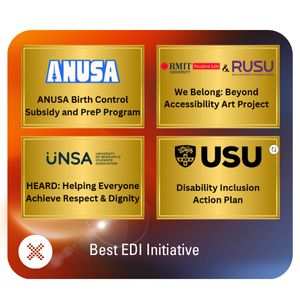
The Session will showcase the Finalists of the Best Equity, Diversity & Inclusion Initiative in the 2025 Student Experience Network Awards.
ANUSA – ANUSA Birth Control Subsidy and PreP Program
The ANUSA Birth Control Subsidy and PreP Program provides ANU students with affordable access to essential reproductive and sexual health services through 50% reimbursement on birth control and Pre-Exposure Prophylaxis (PreP) costs, up to $250 annually. Designed to remove financial and structural barriers, the programs are inclusive, stigma-free, and simple to access, with collaboration from the Women’s and Queer* Departments ensuring they meet the needs of diverse student communities. Since 2024, over 1,000 students have benefited, receiving $20,000 in direct support, particularly aiding women, non-binary, trans, and queer students, while promoting proactive sexual health practices. The initiative demonstrates a scalable, community-focused model of health equity and student welfare.
RMIT University Student Life and RMIT Universtiy Student Union – We Belong: Beyond Accessibility Art Project
The We Belong – Beyond Accessibility Art Project at RMIT University fostered inclusion and belonging for d/Deaf and Disabled students through co-creative, immersive art experiences. Central to the project was Metropolis, a large-scale artwork developed with student and alumni participation, allowing participants to explore accessibility, allyship, and personal expression through staged, interactive installations. Over two years, the initiative incorporated mentorship for emerging Disabled artists, student roundtables, social media education campaigns, and public exhibitions, amplifying underrepresented voices while building networks, confidence, and leadership skills. Outcomes included meaningful engagement of 45 d/Deaf and Disabled students and 200 non-disabled peers, widespread campus activation, 54,000+ social media views, and the creation of a lasting artwork and community legacy that supports ongoing dialogue on accessibility, inclusion, and universal design.
UNSA – HEARD: Helping Everyone Achieve Respiecr & Dignity
HEARD: Helping Everyone Achieve Respect and Dignity is a cultural initiative by the University of Newcastle Students’ Association (UNSA) and The Wollotuka Institute that reclaims the intent of Harmony Day by aligning it with the UN’s International Day for the Elimination of Racial Discrimination. The program combines education, truth-telling, and celebration, offering students interactive stalls, live performances, cultural activities, and speeches from Indigenous and international students to highlight the historical context of the day and ongoing issues of racism. Delivered across multiple campuses, HEARD fosters cross-cultural connection, allyship, and critical reflection, while providing accessible resources both in-person and online. Early outcomes show strong engagement, positive feedback, and increased student awareness of the day’s history, laying the groundwork for a lasting, annual initiative that promotes respect, inclusion, and cultural understanding.
USU – Disability Inclusion Action Plan
The University of Sydney Union’s Disability Inclusion Action Plan (DIAP) was launched to improve access, representation, and equity for disabled students and staff, addressing physical, digital, social, and cultural barriers across the university community. Developed through extensive consultation with students, staff, and accessibility experts, the DIAP is structured around five strategic pillars—Student Experience, Physical and Digital Environments, Employment, Awareness Raising, and Representation and Consultation—with clear actions, timelines, and accountability. Key outcomes include the creation of a three-year roadmap, a dedicated student-facing role to support implementation, disability-focused community events, improved accessibility at flagship events like Welcome Fest, and the adoption of inclusive practices and disability confidence training across USU departments. Overall, the initiative has strengthened inclusion, amplified student voices, and positioned USU as a leader in embedding long-term disability inclusion in student organisations.



